Public Holidays in Dubai: A Cultural Insight
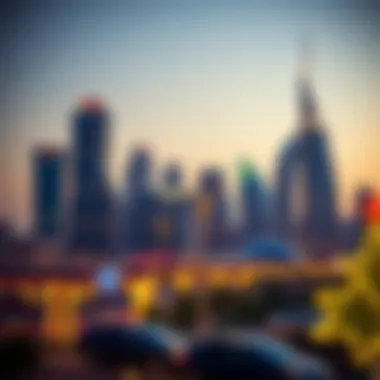
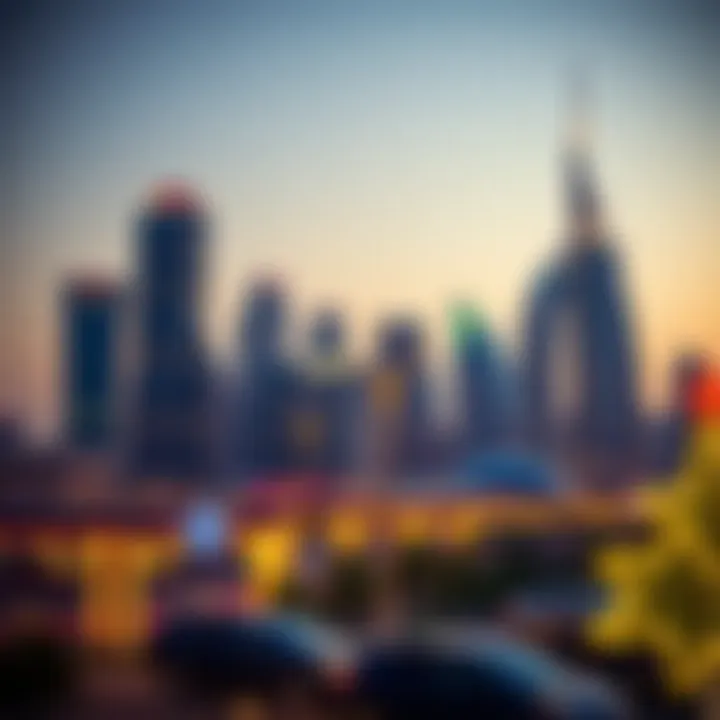
Intro
Dubai is a melting pot of cultures, where tradition meets modernity in a dance of vibrant celebrations. Public holidays here are much more than days off from work; they are a reflection of the rich tapestry that makes up this dynamic city's identity. From the joyous festivities of Eid al-Fitr to the bustling streets during National Day, each holiday holds significance and unravels stories that connect the past to the present.
Exploring these public holidays offers valuable insights into the customs and beliefs that shape the daily lives of both residents and visitors. Not only do they mark important religious observances and national pride, but they also showcase how Dubai embraces its multicultural roots, creating a unique harmony amidst its skyscrapers and souks.
The following sections will delve deeper into each holiday, providing not just dates and celebrations, but also the historical context and social implications that enrich understanding. It's an invitation to witness Dubai through the lens of its public observances, showing how they impact societal dynamics and lifestyle choices. Let's embark on this journey into Dubai's cultural landscape, gathering insights that could be beneficial for expatriates, investors, and anyone eager to grasp the essence of life in this remarkable city.
Overview of Public Holidays in Dubai
In a city as vibrant and diverse as Dubai, public holidays play a crucial role in shaping the cultural landscape. These observances are not mere days off from work; they embody the spirit of unity, tradition, and celebration that is deeply woven into the fabric of Emirati life. Understanding the significance of public holidays in Dubai is essential for anyone keen on exploring its unique blend of heritage and modernity.
Historical Context
The roots of public holidays in Dubai stretch back centuries, deeply connected to the Islamic calendar and significant events that have shaped the region. The most pivotal holidays stem from key Islamic observances, reflecting the influence of religion on daily life. For instance, holidays like Eid Al-Fitr and Eid Al-Adha are derived from the lunar calendar and hold profound spiritual implications for Muslims. These occasions mark triumph over hardship, gratitude for blessings, and the value of community.
Dubai’s public holidays also reflect its evolution from a modest trading port to a global metropolis. In the backdrop of the UAE's formation in 1971, National Day was established to honor unity and independence, thus adding a layer of historical significance to the array of observances.
Cultural Significance
Cultural observances in Dubai are demonstrations of communal bonds, enriched by the city’s multicultural tapestry. During holidays, you will often find the streets adorned with lights and decorations, inviting all to participate in the festivities, regardless of their background. These celebrations are not just for locals; expatriates and tourists alike are welcomed to engage in the joyous spirit.
Events like National Day, with its parades and fireworks, symbolize unity not just among Emiratis, but also celebrate the contributions of the diverse communities that call Dubai home. The emphasis on inclusivity underscores the city's progressive approach to cultural exchange, providing a sense of belonging that resonates with residents and visitors.
Diversity of Observances
Dubai's calendar of public holidays is a colorful mosaic that reflects its unique identity. The variety is staggering, covering religious holidays such as Eid Al-Fitr and Eid Al-Adha, each with unique traditions and rituals. Then there are secular holidays such as National Day, where patriotic sentiments merge with cultural pride.
Consider the following:
- Eid Al-Fitr marks the end of Ramadan, celebrated with family gatherings and festive meals.
- Eid Al-Adha emphasizes sacrifice and compassion, highlighted by communal prayers and charity.
- National Day is an expression of national pride, showcasing local cultures through art, dance, and food.
This mix of observances illustrates how Dubai is steeped in centuries-old traditions while remaining dynamic and influenced by global trends. For investors and expats alike, recognizing this diversity helps appreciate how public holidays can impact business operations, tourism, and even community engagement.
Understanding the cultural landscape of public holidays in Dubai is vital for navigating personal or professional interactions while living in this flourishing metropolis.
Through this exploration, it’s clear that the fabric of Dubai is not just about skyscrapers and shopping malls; it’s also deeply rooted in cultural customs and meaningful celebrations that invite all to partake.
Major Holidays Observed
Public holidays in Dubai play a pivotal role in weaving the intricate tapestry of its cultural landscape. Particularly for investors, expatriates, and those seeking to understand the dynamics of life here, these holidays present opportunities for cultural immersion and economic engagement. They are not merely days off work; they reflect deep-rooted traditions, community spirit, and economic rhythms that shape the lives of both residents and visitors. In this section, we delve into some of the major holidays celebrated, exploring their significance and impact on society in Dubai.
Eid Al-Fitr
Significance of Eid Al-Fitr
Eid Al-Fitr marks the end of Ramadan, the holy month of fasting. This holiday signifies the joy of breaking the fast, uniting families and communities. During this time, people express gratitude and share blessings, often embodying the spirit of compassion. Economically, Eid Al-Fitr also represents one of the peak retail periods in the UAE, with many shopping malls offering large discounts and special sales. The essence of this holiday lies in its ability to strengthen social bonds, making it a cherished occasion for all.
Traditional Practices
During Eid Al-Fitr, traditional practices have a unique charm. Families come together for prayer in mosques and parks, often wearing new clothes and exchanging gifts. One of the highlight is the "Zakat Al-Fitr," a form of charity given to the needy before the Eid prayer. This ensures everyone can partake in the celebrations. The traditions surrounding Eid add layers to the overall cultural experience in Dubai, reflecting a blend of piety and community involvement.
Economic Impact
After Ramadan, the economic impact of Eid Al-Fitr can’t be overstated. It drives a significant increase in consumer spending as families shop for gifts, clothing, and food. Hotels and restaurants also benefit, offering special menus and events to cater to the influx of celebrations. This spike in economic activity lays a solid foundation for business during this festive season, creating opportunities for local entrepreneurs as well as established brands.
Eid Al-Adha
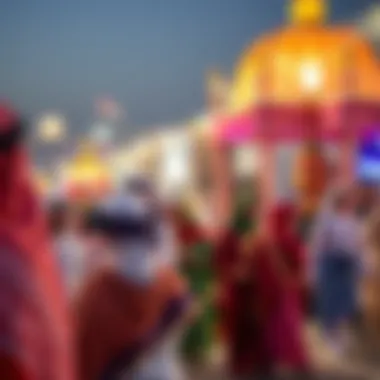
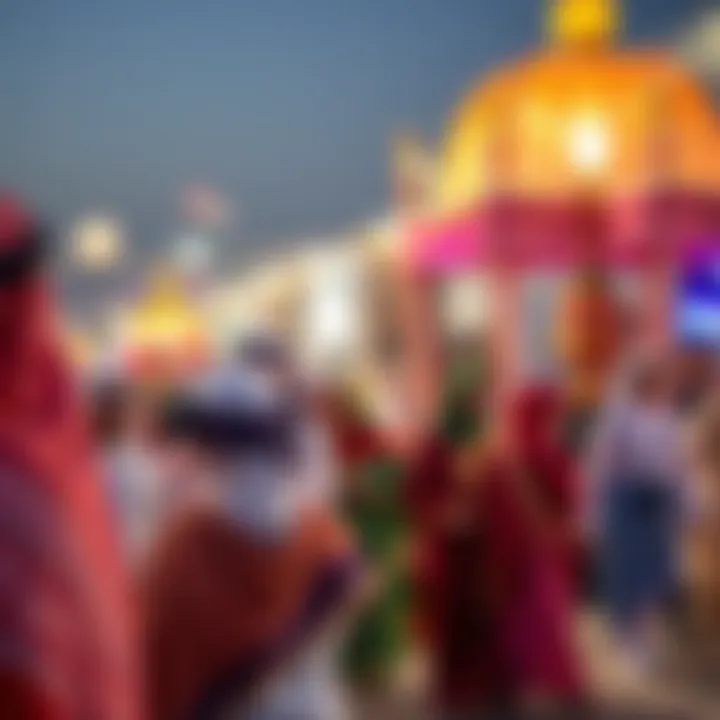
Meaning of Eid Al-Adha
Eid Al-Adha, or the "Festival of Sacrifice," commemorates the willingness of Prophet Ibrahim to sacrifice his son out of obedience to God. This holiday highlights themes of faith, devotion, and sacrifice. It also emphasizes the importance of charitable giving, as a portion of the meat from the sacrificed animal is distributed to the needy, reinforcing social solidarity.
Cultural Celebrations
Cultural celebrations during Eid Al-Adha are quite vibrant. Families gather after morning prayers, sharing meals and stories. In Dubai, you'll find many public events showcasing traditional music and dance, allowing both residents and visitors to enjoy the festive atmosphere. The splendor of these celebrations fosters a sense of belonging and enriches the cultural landscape, making it a truly immersive experience.
Influence on Local Businesses
Eid Al-Adha is a boon for local businesses, particularly in the food and hospitality sectors. Restaurants prepare special menus, and butchers see a rush in demand for lamb and goat as families prepare for the traditional feast. This surge in commerce not only uplifts local economies but also encourages community engagement as businesses connect with their clientele through tailored offerings.
National Day
Historical Importance
The UAE's National Day, celebrated on December 2nd, holds immense historical significance, marking the union of the seven emirates. This day serves as a reminder of the journey toward independence and togetherness. It showcases a deep sense of pride among Emiratis and residents, reflecting the merger of cultures that contribute to Dubai's rich identity.
Public Celebrations
Public celebrations on National Day draw large crowds at various venues across Dubai. Parades featuring traditional dances, displays of historical artifacts, and colorful floats celebrate the emirates’ collective history. These events serve as a bright reminder of the shared values and aspirations of the UAE's diverse populations, garnering both local and international attention.
Fireworks and Festivities
Fireworks mark the National Day celebrations, lighting up the skyline of Dubai. The grandiose displays are not just a feast for the eyes; they're a joyful proclamation of unity and nationhood. Coupled with concerts and community events, the festivities create a vibrant atmosphere that sparks enthusiasm and fosters camaraderie among attendees.
Islamic New Year
Religious Observance
The Islamic New Year, while quieter in celebration compared to Eid, holds deep religious significance. It is a time for reflection and gratitude as communities honor the Hijra, the Prophet Muhammad's migration from Mecca to Medina. This observance encourages individuals to ponder their personal growth and set intentions for the year ahead, enriching their spiritual journeys.
Reflections and Resolutions
This period is marked by introspection and resolving to better oneself in various aspects of life. As families and individuals come together to share meals and stories, the Islamic New Year offers a moment to renew commitments to faith, family, and community, creating a sense of purpose moving forward.
Community Activities
During the Islamic New Year, local mosques often organize community activities, encouraging neighborly interactions and fostering connections. Events such as lectures on spirituality and the importance of community bring together people from all walks of life, reinforcing social ties in the ever-evolving Dubai landscape.
Prophet Muhammad's Birthday
Commemorative Practices
The birthday of Prophet Muhammad is marked by various commemorative practices, including prayers and readings from the Quran. Many mosques host special gatherings on this day, furthering understanding of the Prophet’s teachings. The serenity of these gatherings fosters a peaceful atmosphere conducive to reflection and learning.
Cultural Activities
Cultural activities surrounding this holiday are rich with historical and spiritual elements. Art exhibitions and poetry readings may celebrate Islamic heritage. Such events draw attention to the artistic expressions within Islamic culture, providing a deeper insight into the essence of Dubai’s diversification.
Significance in Islam
This day weighs heavily in Islamic traditions. It calls upon believers to reflect on the Prophet's life, values, and teachings. In Dubai, this observance extends beyond religious significance, marking a day of compassion, love, and community, thereby enriching the overall cultural mosaic of the city.
Overall, the major holidays observed in Dubai offer invaluable insights into its rich cultural fabric. From the significance of Eid, the pride of National Day, to the quiet reflections during the Islamic New Year, each festivity shapes the experience of individuals while promoting unity within its diverse communities.
Public Holidays and Economic Factors
Understanding the interplay between public holidays and economic dynamics is crucial for grasping Dubai's multifaceted culture and environment. These holidays are not merely days off work; they represent significant periods that shape community behaviors, spending habits, and even investment opportunities. The economic implications are broad, affecting everything from retail to tourism, and ultimately contributing to the city's overall growth.
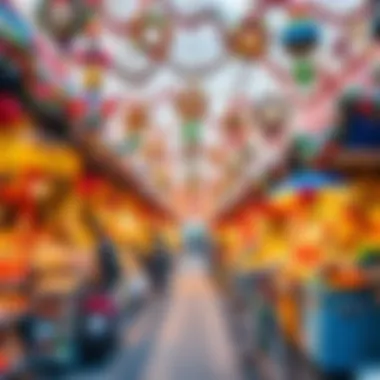
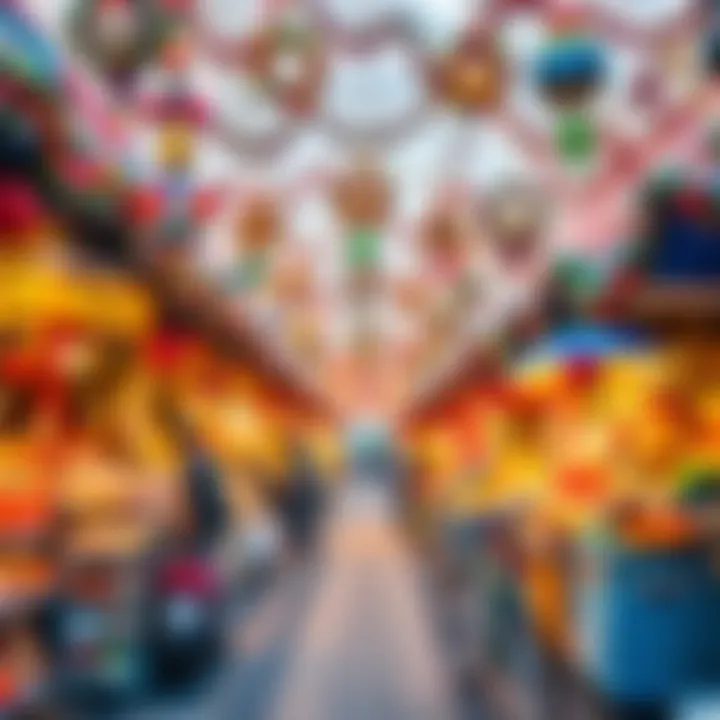
Impact on Business Operations
Public holidays in Dubai deeply influence how businesses operate. Many companies see a fluctuating demand for goods and services during these times. For example, during Eid Al-Fitr and National Day, sales in retail rise as consumers engage in gift-giving and celebrations. However, businesses must plan carefully, as sourcing inventory can become challenging with unpredictable supply chains.
Additionally, operating on holiday schedules often leads to reduced hours or temporary closures. Employers may need to navigate labor laws and employee needs on these days, balancing holiday pay and possible overtime. This highlights the necessity for foresight in scheduling and operational adjustments.
Tourism During Holidays
Holidays in Dubai also trigger waves of tourism, offering a wellspring for the local economy. Visitors are drawn to the atmosphere of celebration, seeking to immerse themselves in local traditions as well as experience renowned attractions.
Travel Trends
Travel trends during public holidays showcase a marked increase in activity. People traveling to Dubai tend to align their vacations with celebratory events, leading to busier airports and packed itineraries. These trends often reveal that most tourists prefer to visit during major holidays like Eid Al-Fitr.
This makes it a beneficial time for tour operators who capitalize on packaged experiences, sometimes offering discounts or themed events. However, this surge also brings challenges such as overcrowding at popular destinations, leading to longer wait times and diminished experiences.
Hotel Occupancy
Hotel occupancy rates soar during public holidays in Dubai. This surge is attributed to both local and international travelers looking to partake in the festivities. Full occupancy becomes common, with many establishments raising room rates due to high demand.
But this trend is a double-edged sword. While it boosts revenue for the hospitality sector, it can also discourage visitors if prices escalate too high. The challenge lies in maintaining affordability, so a wide range of guests can still enjoy Dubai's allure without breaking the bank.
Local Attractions
Local attractions play a vital role in the tourism landscape during holidays. Visitors flock to places like the Burj Khalifa and traditional souks, seeking unique experiences that resonate with the festive atmosphere. Special events or exhibitions often coincide with these holidays, showcasing the rich heritage and culture of Dubai.
However, the popularity of these attractions can lead to overcapacity, potentially diminishing the quality of the visitor experience. As attractions work to accommodate the influx, they must also strive to maintain the essence of what makes them special.
Public Sector Observances
Public sector observances in Dubai play a crucial role in defining the rhythm of the city through its public holidays. These observances not only mark significant dates on the calendar but also reflect the values and priorities of a society that is deeply rooted in its traditions while navigating the currents of modern living. Understanding how these holidays are scheduled and their impact on public services provides insights into the practical aspects of daily life in this dynamic environment.
Holiday Scheduling for Government Employees
Standard Timelines
Holiday scheduling for government employees in Dubai follows established standard timelines that promote consistency and reliability. Typically, these timelines are announced at the beginning of the year, allowing employees to plan their year ahead. One of the key characteristics of these schedules is the fixed nature of holidays, dictated by the Islamic lunar calendar and national observances. This predictability offers multiple benefits: it helps employees to anticipate time off, prepares businesses for reduced operations, and allows families to organize travel plans.
A unique feature of these standard timelines is that they can vary slightly from year to year, depending on lunar sightings for Islamic holidays. While this variability might cause some inconvenience, it also adds an element of excitement to the observances. For instance, some employees may look forward to receiving an extended holiday if a holiday falls near the weekend, giving them more time to celebrate. However, it can also lead to confusion if not communicated clearly.
Extended Holidays
On the other hand, extended holidays are an essential part of Dubai's holiday culture, especially during significant occasions like Eid. Extended holidays not only provide additional time for personal reflection and family bonding but also allow for broader public celebrations. Given their popularity, many employers, particularly in the public sector, embrace this custom by granting additional leave beyond the official observances.
One notable aspect of extended holidays is their ability to boost local businesses and tourism. When government employees have extra time off, they often travel, resulting in increased spending in various sectors, such as hospitality and retail. However, the reliance on extended holidays does present a challenge; businesses must strike a balance between accommodating employee needs and maintaining operational efficiency.
Influence on Public Services
The observance of public holidays significantly influences service availability in Dubai, impacting everything from transportation to education.
Service Availability
During public holidays, there is often a scaling back of services provided by government agencies. This reduction can vary; for instance, essential services like healthcare and emergency services remain fully operational, while non-essential services may shut down completely. The key characteristic of service availability during holidays is that it aims to ensure public safety while allowing employees time to celebrate.
For example, banks typically close during major holidays, which presents both advantages and disadvantages. On one hand, people benefit from uninterrupted time with family. On the other hand, it can lead to inconvenient situations for residents needing urgent financial services.
Emergency Services
Emergency services, on the other hand, have strict protocols to ensure that they remain functional during public holidays. The government ensures that these critical services are staffed adequately, reflecting the commitment to safety and public health. This choice is paramount during holidays, when celebrations can lead to increased incidents that require immediate attention.
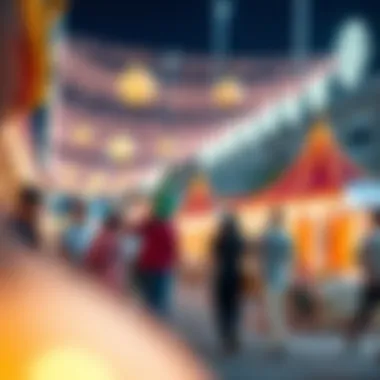
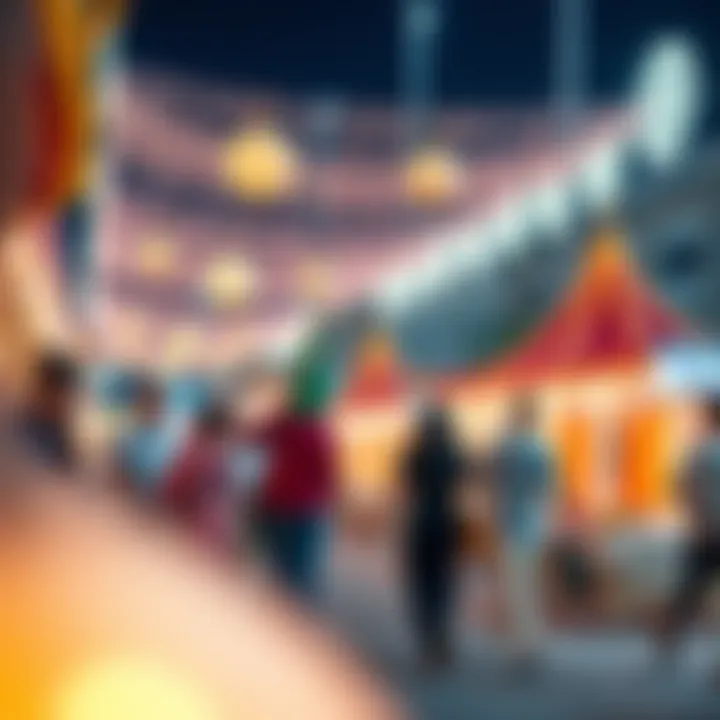
Despite being fully operational, emergency services might face challenges, such as staffing limitations due to colleagues being on leave. In these instances, the reliance on additional shifts or volunteers becomes fundamental to maintaining efficiency and responsiveness.
Observations from Expat Community
The Observations from the expat community is a vital aspect of the public holidays landscape in Dubai. With a multicultural mix of residents, expatriates play a significant role in shaping the city’s holiday celebrations, creating a dynamic blend of traditions and modernity. This part of the article explores how expats not only observe local holidays but also contribute to the festive atmosphere, enriching both their own experiences and those of the Emirati community.
Integration of Expats in Local Celebrations
Participatory Events
Participatory events are a cornerstone of the holiday experiences in Dubai. These gatherings often include activities like food fairs, traditional dance performances, and community service initiatives that invite expats to engage directly with local customs. By joining such events, expats are not merely spectators, but active participants in the national narrative. One key characteristic of these events is the opportunity for interaction between different cultures, which fosters a sense of belonging among expatriates while deepening their understanding of Emirati traditions.
A unique feature of participatory events is their ability to break down sociocultural walls. Expats who take part find they can learn about the customs that surround celebrations like Eid and National Day while sharing their own traditions, be it food, dance, or art. An advantage of these occasions is the bonding that occurs, nurturing a sense of community. However, sometimes, expats might hesitate to engage fully due to the fear of cultural insensitivity, but these events generally promote inclusivity and openness.
Cultural Exchanges
Cultural exchanges represent another enriching avenue for expats during public holidays. They provide a platform where locals and expatriates share their diverse heritages, creating moments of understanding and appreciation. What's particularly striking is the variety of opinions and perspectives that emerge from these exchanges; they reflect the richness and complexity of a multicultural society like Dubai.
These exchanges can take numerous forms—ranging from cooking classes showcasing traditional Emirati dishes to storytelling sessions highlighting various aspects of different cultures. A standout feature of cultural exchanges is the genuine curiosity displayed by both ends; locals are often eager to learn about what their expat neighbors celebrate, while expatriates gain insight into the native customs that shape daily life in the emirate. The primary benefit is the fostering of mutual respect, though a challenge is the potential for miscommunication due to language barriers or differing cultural contexts.
Unique Experiences of Expatriates
Celebrating Diverse Holidays
Celebrating diverse holidays is an integral part of life for many expatriates in Dubai. This isn’t limited to their own national holidays but extends to local festivities. The diversity of nationalities in Dubai means that holidays from around the world are acknowledged, creating a vibrant tapestry of celebrations. A key characteristic of this phenomenon is the fusion of different cultural practices, where expats introduce their traditional festivities and incorporate elements of local holidays into their celebrations.
A unique feature here is how some expatriates incorporate local flavors into their own holiday traditions, such as adapting food recipes to incorporate Gulf spices or using Arabic calligraphy in holiday decorations. This enriches the community while allowing expats to stay connected to their roots. One advantage is that it creates an inclusive atmosphere, though the downside can sometimes be the oversaturation of events that might make people feel overwhelmed.
Community Engagement
Community engagement during holidays is pivotal for expatriates wanting to connect deeply with the local environment. Activities such as volunteering during Ramadan or joining charity drives on National Day emphasize the spirit of giving that permeates many of these celebrations. The essence of community engagement lies in its collaborative spirit, where both expats and locals come together for a greater cause.
The unique feature of this engagement is the shared sense of purpose it establishes, which helps foster relationships among diverse groups of people. Celebrating together gives expatriates a sense of belonging they may miss, aiding their adaptation in a foreign land. However, it is essential to recognize that some expats might initially feel like outsiders in these activities due to language or cultural gaps; nonetheless, the willingness of the community generally eases these concerns.
The strength of Dubai's public holidays lies in the collaboration between local and expatriate communities, painting a vivid picture of cultural integration.
This tapestry of shared experiences and celebrations creates a unique cultural landscape, making Dubai not just a melting pot of traditions, but a vibrant celebration of global unity.
Future Trends in Holiday Observance
Understanding the future trends in holiday observance in Dubai carries significant importance in the cultural landscape. As the city continues to develop into a global hub, the way these holidays are celebrated evolves. This can affect social cohesion, community spirit, and even economic opportunities. Investors, expatriates, and residents alike should grasp how traditions might shift with modernization and expanding globalization. Several factors are at play, including the influence of contemporary practices and advancements in technology that reshape how holidays are perceived and celebrated.
Evolving Celebrations
Modern Influences
Modern influences on holiday celebrations are reshaping traditional practices. One crucial aspect of this is the growing trend toward inclusivity, where various cultural groups participate in each other's festivities. It's not just about Muslims celebrating Eid or National Day; expatriates and newcomers also bring their unique customs to the stage. This blending of practices creates a rich tapestry that reflects Dubai's multicultural identity.
A key characteristic of these modern influences is the focus on communal engagement and celebration, fostering a sense of belonging among diverse groups. This characteristic turns holiday observances into opportunities to build bridges across various cultures. One of the more beneficial outcomes of this is the stronger sense of unity amongst residents in Dubai— where differences are celebrated rather than viewed as barriers.
However, one unique feature of these evolving celebrations is that some traditional practices may be diluted. While this might bring a fresh perspective, it can also lead to criticisms from those who advocate for the preservation of authentic cultural practices.
Technological Impacts
The role of technology in holiday observance cannot be overlooked. The digital tools and social media platforms enable people to connect and share experiences in real time, effectively enhancing participation. For instance, many residents engage with live streaming services or social media platforms during significant events like National Day. This leads to a broader audience, connecting people who are not physically present.
A significant aspect of technological impact is its ability to facilitate organization for events and gatherings, from online invitations to virtual events. It simplifies logistics, allowing for a larger participation base. Yet, while technology has tremendous advantages, there are certain disadvantages to consider. The over-reliance on digital interactions can sometimes overshadow the personal, face-to-face experiences that are essential for nurturing community bonds.
Cultural Preservation vs. Globalization
Cultural preservation in the face of globalization poses an important discussion point regarding how holidays are observed. As the character of Dubai changes with globalization, there’s a genuine concern about maintaining local traditions and practices amidst a tide of global influences. While multiculturalism enriches the city, there's often tension regarding how much of the local culture can be maintained without losing its essence.
The balance between embracing global cultures and maintaining authentic local traditions is delicate and essential for future generations.
For citizens and long-term residents, engaging in discussions about cultural preservation can pave the way for strategies that protect key aspects of local identity while embracing modern influences. It's a two-way street, where individuals can celebrate their roots while also welcoming others to share their stories. The future of holiday observance in Dubai might just hinge on how well these two elements can coexist.















